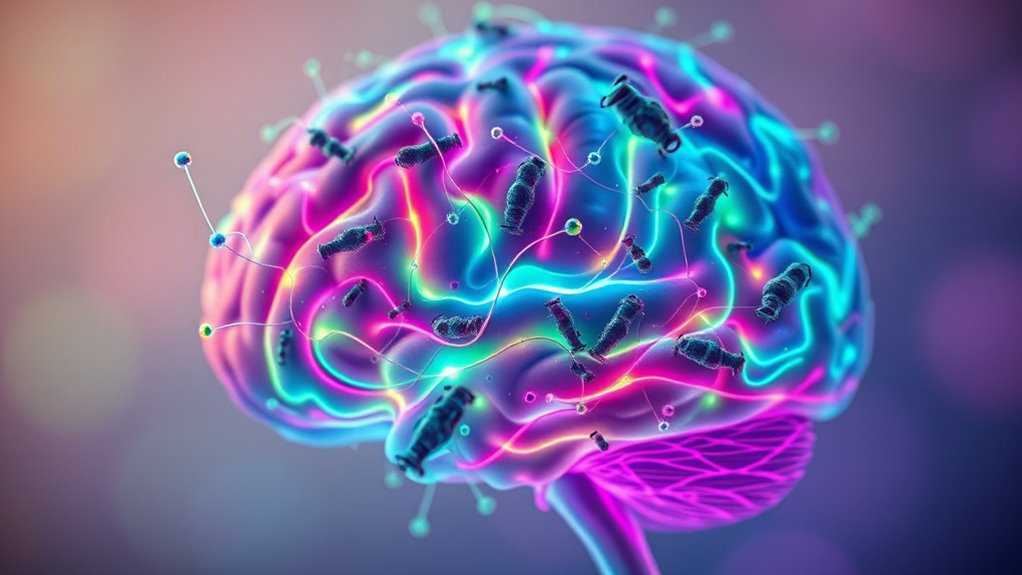Your gut microbiome plays a crucial role in your mental health by producing mood-influencing chemicals like serotonin and GABA, which impact your mood and resilience. When your gut bacteria are balanced and diverse, they support better brain function and emotional stability. Disruptions can cause mood swings, anxiety, or depression. Maintaining a healthy diet and managing stress help support your gut-brain connection. If you’d like to discover more about how this connection works, keep exploring.
Key Takeaways
- The gut microbiome produces neurotransmitters like serotonin and GABA that influence mood and emotional well-being.
- Microbial diversity in the gut supports mental resilience and reduces the risk of mood disorders such as anxiety and depression.
- Gut hormones communicate with the brain via the gut-brain axis, affecting stress responses and mental health.
- Imbalances in gut bacteria can disrupt neurotransmitter levels, leading to mood swings, anxiety, or depression.
- Dietary and lifestyle factors, like fiber intake and stress management, help maintain a healthy microbiome and support mental clarity.
The Role of Gut Bacteria in Mood Regulation
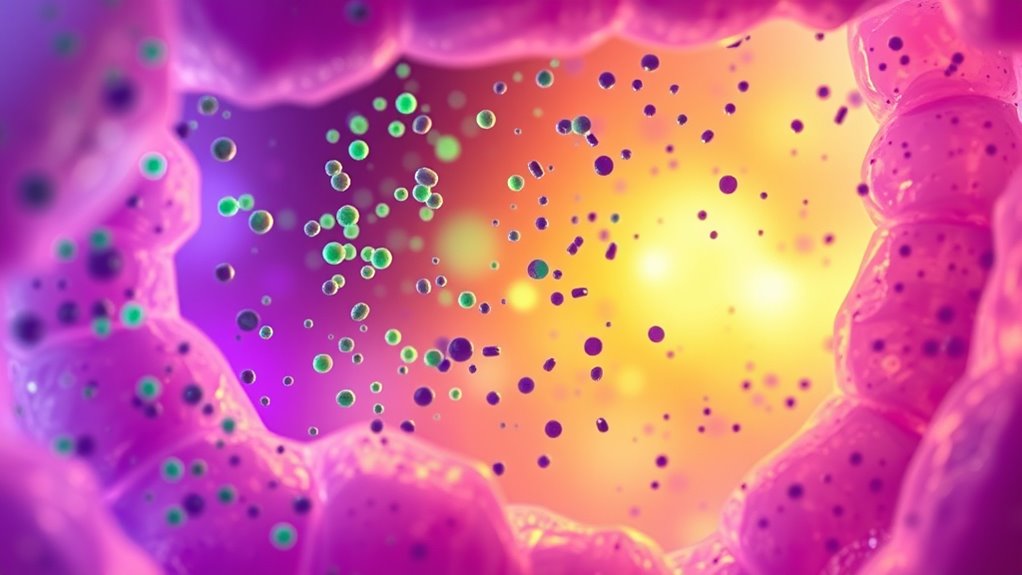
The gut microbiome plays an essential role in regulating mood by influencing brain chemistry and function. Your gut bacteria help produce and modulate gut hormones that communicate with your brain, affecting your emotional state. They also play a key role in neurotransmitter production, such as serotonin and GABA, which directly impact your mood and anxiety levels. When these bacteria are balanced, they support the production of mood-enhancing chemicals, promoting a sense of well-being. Additionally, maintaining a healthy microbiome can enhance air quality benefits, which may indirectly support mental health through overall physical wellness. Conversely, disruptions in your gut microbiome can lead to decreased levels of these neurotransmitters, potentially contributing to feelings of depression or anxiety. By maintaining a healthy microbiome, you support the complex communication networks between your gut and brain, helping to regulate your mood naturally and effectively.
How Microbiome Imbalances Influence Anxiety and Depression
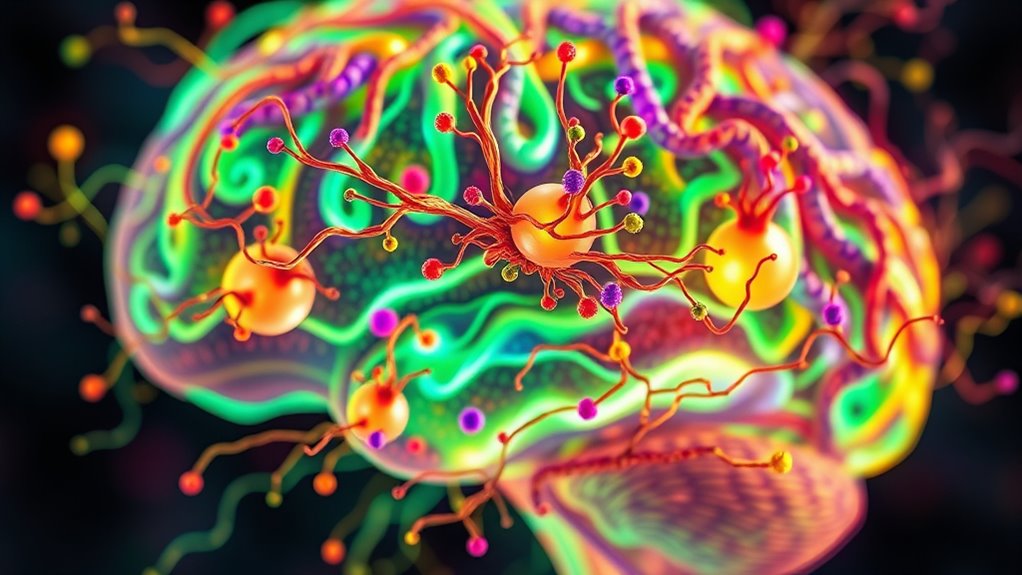
Imbalances in your gut microbiome can profoundly influence anxiety and depression by disrupting the production of key neurotransmitters and hormones. When microbiome diversity decreases, your body struggles to maintain mental resilience, making you more prone to mood disorders. These imbalances can alter serotonin, dopamine, and GABA levels, which are crucial for regulating mood and stress responses. A less diverse microbiome often correlates with higher anxiety and depressive symptoms. To visualize this, consider the table below:
| Microbiome Diversity | Mental Resilience |
|---|---|
| High | Strong |
| Low | Weak |
| Imbalanced | Vulnerable |
Fostering microbiome diversity supports mental health, reducing anxiety and depression risks. Microbiome diversity plays a vital role in maintaining overall emotional wellbeing. Additionally, incorporating nutrient-rich ingredients from juice cleanses can help support gut health and improve mood stability. Supporting a healthy gut microbiome through diet and lifestyle changes can further enhance mental resilience and emotional balance.
The Gut-Brain Axis: Connecting Digestion and Mental Wellness
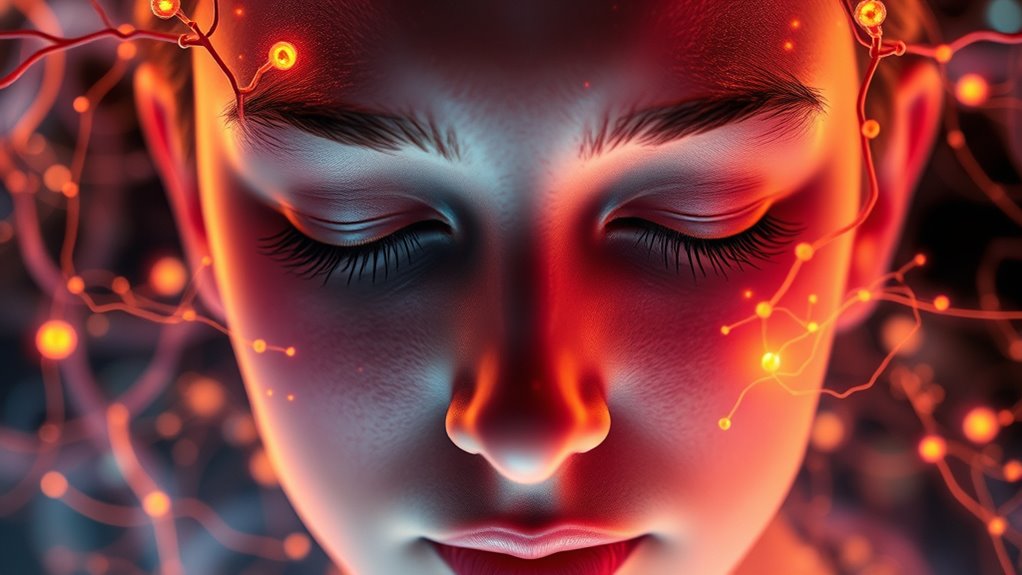
Since your gut and brain constantly communicate, the gut-brain axis acts as a vital highway linking digestion to mental wellness. This connection involves gut hormone modulation, where your gut releases chemicals affecting mood and stress responses. A diverse microbiome enhances this communication by supporting microbiome genetic diversity, which strengthens the production of beneficial compounds. When your microbiome is balanced, it helps regulate neurotransmitters like serotonin, influencing your mental state. Disruptions in this axis can lead to mood swings, anxiety, or depression. Maintaining a healthy microbiome through balanced diet and lifestyle choices can support mental health**, further reinforcing the importance of gut health in overall well-being. Emerging research also suggests that a diverse microbiome is crucial for optimal communication within the gut-brain axis. Optimizing the microbiome through diet and lifestyle choices can improve gut health**, further supporting mental well-being. By understanding this link, you realize that maintaining a healthy gut isn’t just about digestion—it’s about supporting your overall mental health. The gut-brain axis underscores how interconnected your physical and mental wellness truly are.
Impact of Diet on Microbial Diversity and Mental Health

Your diet plays a powerful role in shaping the diversity of your gut microbiome, which in turn influences your mental health. Consuming fermented foods like yogurt, kefir, and sauerkraut introduces beneficial probiotics that boost microbial diversity, supporting a healthier gut-brain connection. Dietary fiber from fruits, vegetables, and whole grains acts as fuel for good bacteria, promoting their growth and activity. A diverse microbiome enhances the production of neurotransmitters like serotonin, which affect mood and emotional well-being. When your diet includes these foods, you foster a resilient and balanced gut environment, potentially reducing the risk of mental health issues such as anxiety and depression. Focusing on fermented foods and fiber-rich choices can be a simple yet effective way to support your mental health through better gut diversity. Additionally, integrating data-driven marketing strategies such as tracking dietary impacts can help you better understand and optimize your gut health over time.
Stress, Microbiome Disruption, and Psychological Effects
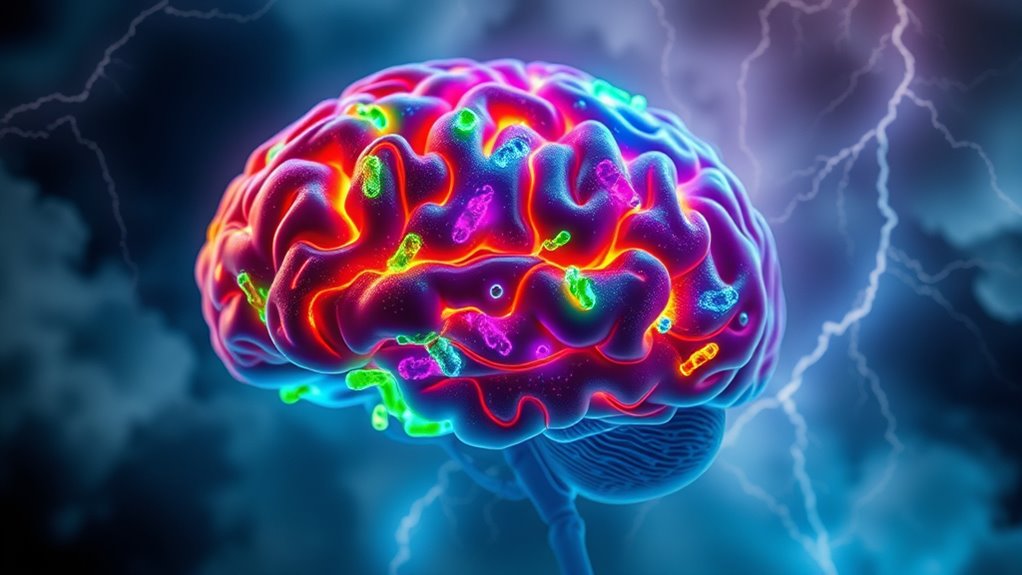
Have you ever wondered how stress can directly impact your gut microbiome? When you’re stressed, your body releases hormones like cortisol, which can disrupt the balance of your gut bacteria. This disruption affects your immune response, making it harder for your body to fight off infections and inflammation. As your microbiome shifts, it can send signals to your brain that influence your mood and mental state, potentially leading to anxiety or depression. Stress also hampers hormonal balance, further impacting your mental health. The combination of immune response changes and hormonal fluctuations creates a cycle where stress worsens microbiome health, which in turn affects your psychological well-being. Recognizing this connection helps you understand how managing stress can support both your gut health and mental resilience. Additionally, understanding the subconscious power during sleep can be a helpful tool for reinforcing positive mental and physical health habits. Exploring gut-brain axis research reveals how closely these systems are interconnected, emphasizing the importance of holistic health approaches. Improving your microbiome health through diet and lifestyle can also play a crucial role in maintaining mental well-being. Recent studies suggest that microbiome diversity is essential for optimal mental health, highlighting the importance of a varied diet.
Probiotics and Prebiotics: Supporting a Healthy Gut for Mental Clarity

Maintaining a balanced gut microbiome is key to supporting mental clarity and overall well-being. Probiotics and prebiotics promote this balance by enhancing fermentation processes and strengthening symbiotic relationships between your gut bacteria and your body. Probiotics introduce beneficial strains, while prebiotics serve as food for these good microbes. Together, they help optimize digestion, reduce inflammation, and support neurotransmitter production, all of which influence mental health. To make it easier, here’s a quick look:
| Probiotics | Prebiotics |
|---|---|
| Live beneficial bacteria | Fibers that feed good bacteria |
| Found in fermented foods | Present in fiber-rich foods |
| Support fermentation processes | Enhance symbiotic relationships |
| Improve gut health | Promote mental clarity |
Incorporate these into your diet to nurture a healthier gut and sharper mind. Gut microbiome plays a crucial role in this process.
Future Perspectives: Microbiome-Based Therapies for Mental Disorders
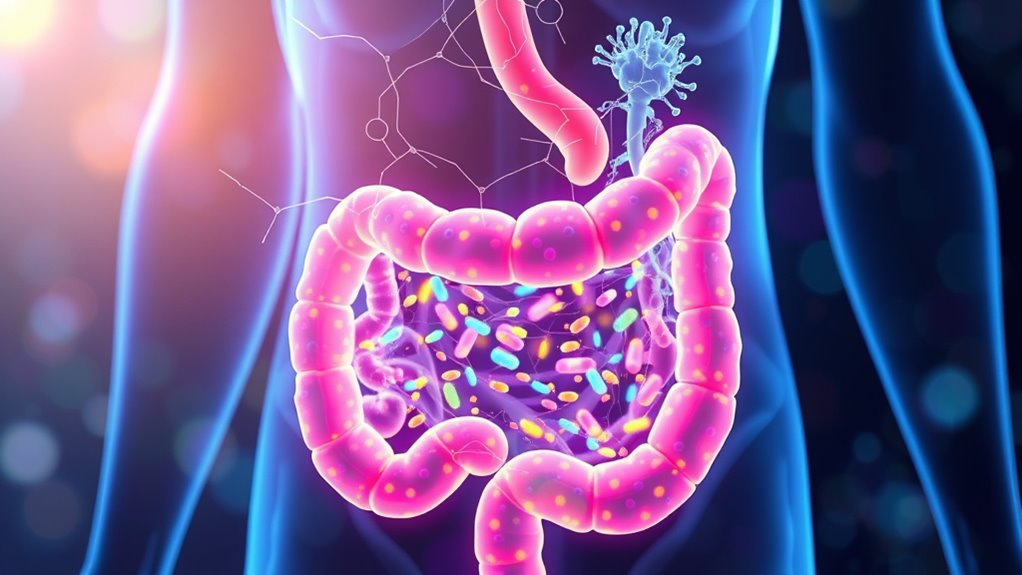
Emerging research indicates that microbiome-based therapies hold promising potential for treating mental disorders. As scientific understanding advances, personalized microbiome therapies could target individual microbiome compositions to optimize mental health outcomes. By analyzing microbiome biomarkers, clinicians may identify specific microbial patterns linked to conditions like depression or anxiety, enabling tailored interventions. These therapies might include custom probiotic formulations, dietary modifications, or microbiota transplants designed to restore a healthy gut-brain axis. The goal is to move beyond one-size-fits-all approaches, offering precise treatments based on each person’s unique microbiome profile. Although still in development, such strategies could revolutionize mental health care, providing safer, more effective options that address underlying gut-brain interactions at a personalized level.
Frequently Asked Questions
Can Gut Microbiome Changes Predict Mental Health Disorders?
You might wonder if gut microbiome changes can predict mental health disorders. Research suggests microbiome biomarkers could help identify risks early, making mental health prediction more accurate. By analyzing specific bacterial patterns, scientists are developing tools to monitor gut health and its impact on mental well-being. While still evolving, this approach offers promising potential for personalized mental health strategies based on microbiome insights.
How Quickly Can Diet Modifications Impact Mental Well-Being?
Imagine your mind as a garden, and your diet as the sunlight and water that nurture it. When you make mindful diet impact changes, you might notice a mood shift within days, as your brain starts to respond to better fuel. While some effects are quick, sustained improvements come from consistent choices, helping your mental well-being bloom like a vibrant spring garden.
Are There Specific Probiotics Proven to Improve Mood?
You might wonder if specific probiotics can boost your mood. Research shows certain probiotic strains, like Lactobacillus and Bifidobacterium, are linked to mood enhancement. These strains help balance your gut microbiome, influencing brain chemistry and reducing anxiety or depression symptoms. While more studies are needed, incorporating these probiotics through supplements or fermented foods could support your mental well-being and contribute to a more positive mood over time.
Does Gut Microbiome Diversity Affect Cognitive Function?
Think of your brain as a bustling city, where microbiome diversity is like the variety of shops and cafes. When diversity is high, your cognitive function flourishes, much like a city thriving with energy and innovation. Research shows that a diverse microbiome supports better memory, focus, and problem-solving. So, maintaining microbiome diversity isn’t just about gut health; it’s key to keeping your mind sharp and agile.
What Lifestyle Factors Most Influence Gut-Brain Health?
You can profoundly influence your gut-brain health by including fermented foods like yogurt, kefir, and sauerkraut in your diet, which introduce beneficial bacteria. Managing stress through mindfulness, exercise, or relaxation techniques also plays a crucial role in maintaining a healthy microbiome. These lifestyle choices help support your gut microbiota balance, positively impacting your mental well-being and cognitive function over time.
Conclusion
As you nurture your gut, you gently steer your mind toward balance and clarity. Embracing healthy foods, managing stress, and considering probiotics can subtly influence your mental well-being. Remember, your microbiome is a quiet partner in your journey, quietly guiding your mood and resilience. With mindful choices, you can help foster a harmonious inner world, where both body and mind flourish in silent, supportive harmony.
